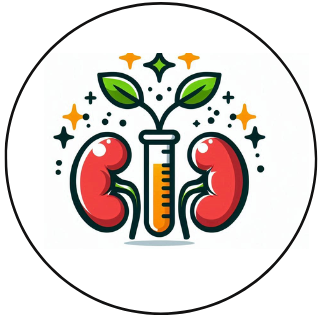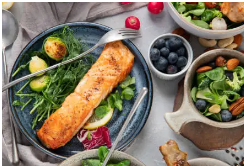Title: Developing a Kidney-Friendly Diet: What’s Good, What’s Not
When it comes to maintaining kidney health or managing kidney disease, a kidney-friendly diet is essential. The right foods can help prevent further damage, alleviate symptoms, and keep your kidneys functioning at their best. But what foods are kidney-friendly? And what foods should you avoid to keep your kidneys happy? Let’s explore the best options and how to manage the three key nutrients that affect kidney health: sodium, potassium, and phosphorus. Plus, we’ll include product suggestions to help make choosing kidney-friendly options easier.
What is a Kidney-Friendly Diet?
A kidney-friendly diet focuses on eating foods that support kidney function and limit the intake of substances that could stress your kidneys. If you have chronic kidney disease (CKD) or are at risk for kidney problems, modifying your diet can help manage symptoms and protect your kidneys from further damage.
Kidney Friendly Foods: What to Include
Certain foods are great for your kidneys, as they are nutrient-dense while being low in the harmful elements (like sodium, potassium, and phosphorus) that can impact kidney health. Here’s a list of kidney-friendly foods to consider including in your diet:
1. Leafy Greens (Low Potassium Options)
- Examples: Kale, spinach (in moderation), arugula, lettuce, cabbage.
- These are rich in vitamins and minerals while being relatively low in potassium, which is crucial for kidney health. Just be careful with high-potassium varieties (e.g., spinach, potatoes) if you have kidney disease.
Product Suggestion: Organic Baby Kale or Arugula – Pre-washed and ready to eat, making it easier to add to salads or smoothies.
2. Berries
- Examples: Blueberries, strawberries, raspberries, blackberries.
- Berries are low in potassium and phosphorus, making them perfect for a kidney-friendly diet. They are packed with antioxidants that help reduce inflammation and oxidative stress on the kidneys.
Product Suggestion: Organic Berries – Available in a variety of fresh berries, these are perfect for snacking or adding to dishes like oatmeal or yogurt.
3. Egg Whites
- Why: Egg whites provide high-quality protein without the added phosphorus found in egg yolks.
- Kidney disease often requires careful protein management, and egg whites are a great low-phosphorus option that can help support kidney function.
Product Suggestion: 100% Liquid Egg Whites – An easy way to incorporate egg whites into your diet without the hassle of separating eggs.
4. Rice and Pasta (Refined)
- Why: Both rice and pasta are typically low in potassium and phosphorus, making them a great carbohydrate option for kidney health.
- Whole grains may be too high in phosphorus for individuals with kidney issues, so refined grains like white rice and pasta are often preferred in moderate amounts.
Product Suggestion: White Spaghetti and White Rice – These options are low in potassium and phosphorus and are easy to prepare for a kidney-friendly meal.
5. Apples
- Why: Apples are kidney-friendly because they are low in potassium and packed with fiber, which helps with digestion.
- Apple slices or applesauce are a great snack for those with kidney concerns.
Product Suggestion: Natural Applesauce – Available in single-serving cups, this makes for a convenient and healthy snack option for people with kidney disease.
6. Olive Oil
- Why: Olive oil is a healthy fat and can be used in cooking or as a dressing.
- It’s free from sodium, potassium, and phosphorus, making it ideal for anyone following a kidney-friendly diet.
Product Suggestion: Extra Virgin Olive Oil – This high-quality olive oil is perfect for sautéing vegetables or drizzling over salads.
What Foods are Kidney Friendly? What to Avoid
While there are plenty of kidney-friendly foods, there are also many that can harm kidney health. Here are the foods you should limit or avoid:
1. High-Sodium Foods
- Examples: Processed foods (canned soups, frozen meals, deli meats), salty snacks (chips, pretzels), fast food, restaurant meals.
- Why Avoid: Sodium can cause your body to retain water, which puts extra pressure on your kidneys. Too much sodium can also lead to high blood pressure, which further damages kidney function.
- Tip: Opt for fresh, whole foods, and use herbs and spices instead of salt to flavor meals.
Product Suggestion: Salt-Free Seasoning Blends – A perfect way to add flavor without the sodium, available in various blends like garlic and herb, lemon pepper, and more.
2. High-Potassium Foods
- Examples: Bananas, oranges, potatoes, tomatoes, avocados, dried fruits, spinach, and mushrooms.
- Why Avoid: Potassium helps regulate fluid balance and heart function, but if kidney function is compromised, excess potassium can build up in the blood, causing heart problems.
- Tip: Choose lower-potassium fruits and vegetables, such as apples, grapes, and green beans.
Product Suggestion: Fresh Cut Green Beans – A convenient and kidney-friendly vegetable option that is low in potassium and can be easily added to meals.
3. High-Phosphorus Foods
- Examples: Processed cheese, nuts, seeds, beans, and organ meats.
- Why Avoid: Excess phosphorus can lead to bone health issues and calcification in the blood vessels. The kidneys may struggle to eliminate phosphorus properly, so it’s important to avoid foods high in this mineral.
- Tip: Stick to foods lower in phosphorus, such as fresh fruits, vegetables, and lean meats.
Product Suggestion: Unsweetened Almond Milk – A phosphorus-free alternative to dairy that can be used in smoothies or recipes that call for milk.
4. Dairy Products (in excess)
- Examples: Milk, cheese, yogurt, and ice cream.
- Why Avoid: Dairy can be high in both potassium and phosphorus. While small amounts of dairy might be acceptable for some individuals, large quantities can put unnecessary stress on kidneys.
- Tip: Consider limiting dairy intake or switching to lower-phosphorus alternatives like non-dairy milk or cheese made from almond or rice.
Product Suggestion: Dairy-Free Coconut Milk Yogurt – A dairy-free, phosphorus-friendly option for a creamy, kidney-friendly snack.
5. Red Meat and Processed Meats
- Examples: Bacon, sausages, hot dogs, hamburgers, steaks.
- Why Avoid: High-protein foods like red meat can burden your kidneys, especially when kidney function is impaired. Processed meats are often loaded with sodium and preservatives, further increasing the strain on your kidneys.
- Tip: If you consume animal protein, opt for lean cuts and limit portion sizes. Incorporate plant-based proteins like tofu or beans in moderation.
Product Suggestion: Meatless Meatballs – A plant-based alternative to meat that’s high in protein and kidney-friendly, especially when consumed in moderation.
The Key Nutrients to Watch: Sodium, Potassium, and Phosphorus
- Sodium: Essential for fluid balance, but too much can cause high blood pressure, swelling, and kidney strain. The daily recommended intake for most people is 2,300 mg, but kidney disease patients are often advised to limit this further.
- Potassium: Potassium helps regulate heart and muscle function. If kidney function is compromised, high levels of potassium can lead to dangerous heart arrhythmias. Work with your healthcare provider to determine a safe level of potassium intake.
- Phosphorus: Phosphorus helps build strong bones, but high levels can cause calcium to build up in the blood vessels and tissues. Phosphorus is typically found in dairy, meat, and processed foods, and should be limited in a kidney-friendly diet.
Final Thoughts on a Kidney-Friendly Diet
Eating a kidney-friendly diet involves making careful choices to manage the levels of sodium, potassium, and phosphorus in your body. By focusing on fresh, whole foods, limiting high-sodium and high-potassium foods, and choosing plant-based proteins, you can help protect your kidneys and improve your overall health. When in doubt, consult with a dietitian or healthcare provider to create a personalized plan tailored to your needs.
With the help of these kidney-friendly foods and kidney-friendly product suggestions, you’ll be able to make healthy and informed decisions every day. Remember: a kidney-friendly diet isn’t just about avoiding the bad – it’s about choosing foods that nourish and support kidney function, so your body can thrive.
By following these tips on what foods are kidney friendly and focusing on a balanced approach, you’ll be able to keep your kidneys healthy for years to come. For more information on kidney-friendly foods and to find even more helpful products, feel free to browse additional resources or consult with a dietician/specialist.

